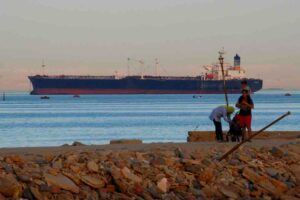Red Sea crisis has ‘little impact’ on European businesses in PHL

THE RED SEA shipping crisis has “little impact” on European companies doing business in the Philippines, the European Chamber of Commerce of the Philippines (ECCP) said.
“It does not necessarily have a big impact because most of the European companies that are established in Southeast Asia also have local production in the region,” said Paulo Duarte, president of the ECCP, at a media briefing on Wednesday.
“So, this will not be a critical factor, but it’s something that we need to observe how it’s going to be developed,” he added.
Shipping traffic through the Red Sea has been disrupted as Yemen’s Houthi rebels continue to attack cargo ships and tankers. The northern part of the Red Sea — the Suez Canal — accounts for around 12% of global trade or 30% of overall global container traffic.
In 2022, about a fourth of all goods imports to the EU were transported via ships from Asia, most of which passed through the Suez Canal.
Mr. Duarte said businesses are “positive” on opportunities in the Philippines.
“(But) we cannot ignore that outside of the Philippines, there are some dark clouds that are not helping,” he said. “But this is not a critical point for European companies, because most of them have already established local structures and local manufacturing in the region so this is something they can overcome.”
Mr. Duarte noted the Philippines should try to take advantage of the situation and invite more European businesses to establish local manufacturing hubs here.
“This could also be an opportunity for the Philippines to attract more European companies to the country because that will allow them to reduce their dependence on such things,” he said, referring to the operations affected due to the Red Sea crisis.
Sought for comment, Trade Secretary Alfredo E. Pascual said the government is looking to attract European businesses that are trying to expand operations here.
“Those that are targeting the ASEAN or Southeast Asian markets but cannot ship to those markets might set up their production and operations here,” he told reporters on Thursday.
“We are now talking with them and there’s going to be a visit to Europe within the next couple months.”
Mr. Pascual said the Department of Trade and Industry (DTI) is assessing the situation in the Red Sea and will provide advice for Philippine exporters affected by the shipping disruption.
Data from the Philippine Economic Zone Authority (PEZA) showed that there are 448 business enterprises engaged in exports to Europe and 523 businesses are engaged in imports from Europe.
The investment promotion agency conducted a survey among the PEZA-registered business enterprises (RBEs) doing business with Europe, and found out that most of the respondents or 252 RBEs said that they are not affected by the crisis.
Only 84 RBEs said their operations were significantly affected by the Red Sea crisis.
For exporters, the RBEs said the Red Sea crisis has resulted in shipping delays of seven days to one month as ships chose to travel via the Cape of Good Hope.
Importers, on the other hand, noted delays of seven days to 20 days in shipments.
Businesses also noted the crisis has resulted in shortages of containers, late confirmation of booking, limited vessels, and port congestion in many areas.
PEZA noted RBEs reported freight costs to Europe and the Middle East have surged by 100%-400%, which is why they resorted to air freight.
Last week, the United Nations Conference on Trade and Development (UNCTAD) raised concerns over the disruptions in global trade stemming from geopolitical tensions affecting shipping through the Black Sea, Red Sea and Panama Canal.
UNCTAD said that it saw a 42% decline in weekly transits going through the Suez Canal in the last two months as major players have suspended Suez Canal transits.
“Notably, container ship transits per week have plummeted by 67% compared to a year ago, with container carrying capacity, tanker transits, and gas carriers experiencing significant declines,” it added. — Justine Irish D. Tabile




